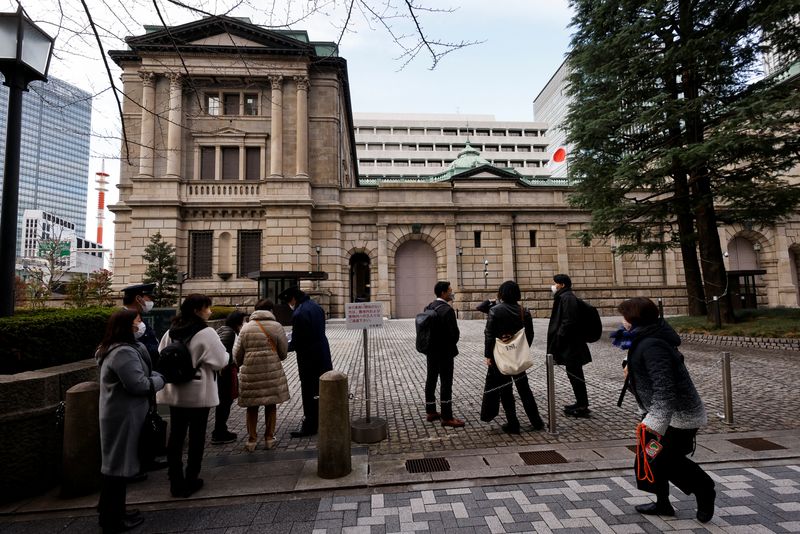By Leika Kihara and Kentaro Sugiyama
TOKYO (Reuters) -A meeting of the government's top economic council on Monday focused on whether recent rises in inflation and wage growth suggest Japan was approaching a sustained exit from deflation.
With inflation accelerating globally and wage growth picking up in Japan, discussions also touched on the desirable timing to end the Bank of Japan's ultra-loose monetary policy, a government official told reporters.
"While there have been some positive signs in recent data, we must ensure they are stable and sustainable so that Japan won't revert to deflation," the Cabinet Office said, according to handout material released after the meeting.
The discussions between the government and central bank are looking at the role each should play in achieving sustained wage hikes to help reduce the risk of a return to deflation.
Japan has not officially declared an emergence from deflation on worries price declines could return. Analysts say a decision that Japan is out of deflation would make it easier for the Bank of Japan to justify ending ultra-low interest rates.
BOJ Governor Kazuo Ueda spoke about the bank's resolve to maintain ultra-loose monetary policy until its 2% inflation target is sustainably met backed by wage growth, the government official said.
Prime Minister Fumio Kishida said the government and BOJ need to coordinate given uncertainty over the economic outlook.
"We're aiming to pull Japan out of deflation and achieve sustained, private demand-driven economic growth" by creating public perceptions that growth and inflation will keep rising, he said.
In a separate session that included private-sector experts, Princeton University academic Nobuhiro Kiyotaki urged the BOJ to end quantitative easing when inflation stabilises around 1-2%, his presentation material released by the Cabinet Office showed.
Kiyotaki added that keeping long-term interest rates low for too long would expose Japan to speculative market attack.
The BOJ's exit from quantitative easing in 2006 had been later criticised by lawmakers for being too premature and delaying an end to economic stagnation.
The central bank had also come under political pressure for doing too little in pulling Japan out of deflation, before former BOJ Governor Haruhiko Kuroda deployed in 2013 a massive stimulus programme that mostly remains in place at present.
With inflation exceeding the BOJ's 2% target, markets are rife with speculation that the central bank will soon phase out its massive stimulus that combines huge asset purchases and a pledge to cap long-term interest rates around zero.

However, data showing Japan's wholesale inflation slowed for a fourth straight month in April may ease pressure on the BOJ to seek an early exit from ultra-low interest rates.
The top economic council occasionally holds a separate session on topics relevant at the time, to take their views into account in setting fiscal and monetary policy.